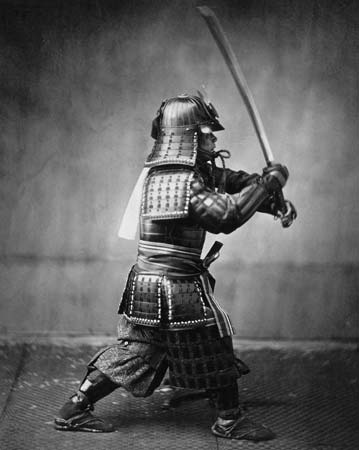samurai
Japanese warrior
 member of the Japanese warrior caste. The term samurai was originally used to denote the aristocratic warriors (bushi), but it came to apply to all the members of the warrior class that rose to power in the 12th century and dominated the Japanese government until the Meiji Restoration in 1868. Emerging from provincial warrior bands, the samurai of the Kamakura period (1192–1333), with their military skills and deep pride in their stoicism, developed a disciplined culture distinct from the earlier, quiet refinement of the imperial court. During the Muromachi period (1338–1573) under the growing influence of Zen Buddhism, the samurai culture produced many such uniquely Japanese arts as the tea ceremony and flower arranging that continue today. The ideal samurai was supposed to be a stoic warrior who followed an unwritten code of conduct, later formalized as Bushidō (q.v.), which held bravery, honour, and personal loyalty above life itself; ritual suicide by disembowelment ( seppuku) was institutionalized as a respected alternative to dishonour or defeat.
member of the Japanese warrior caste. The term samurai was originally used to denote the aristocratic warriors (bushi), but it came to apply to all the members of the warrior class that rose to power in the 12th century and dominated the Japanese government until the Meiji Restoration in 1868. Emerging from provincial warrior bands, the samurai of the Kamakura period (1192–1333), with their military skills and deep pride in their stoicism, developed a disciplined culture distinct from the earlier, quiet refinement of the imperial court. During the Muromachi period (1338–1573) under the growing influence of Zen Buddhism, the samurai culture produced many such uniquely Japanese arts as the tea ceremony and flower arranging that continue today. The ideal samurai was supposed to be a stoic warrior who followed an unwritten code of conduct, later formalized as Bushidō (q.v.), which held bravery, honour, and personal loyalty above life itself; ritual suicide by disembowelment ( seppuku) was institutionalized as a respected alternative to dishonour or defeat.In the early part of the Tokugawa period (1603–1867), the samurai, who accounted for less than 10 percent of the population, were made a closed caste as part of a larger effort to freeze the social order and stabilize society. Although still allowed to wear the two swords emblematic of their social position, most samurai were forced to become civil bureaucrats or take up some trade during the 250 years of peace that prevailed under the Tokugawa shogunate (military dictatorship). Moreover, the rise of the cities and the expansion of a merchant economy during early 18th-century Japan led to the flowering of a vibrant urban culture, which eventually superseded the austere life-style of the samurai. At the same time, the economic position of the samurai, who lived primarily on fixed stipends, was being eroded. In spite of their high social rank, a growing number of samurai families suffered impoverishment by the end of the Tokugawa period.
Lower-ranking samurai, eager for advancement and realizing a new sense of national purpose in the face of encroachment by the Western powers during the mid-19th century, took part in the movement against the Tokugawa regime that resulted in the Meiji Restoration of 1868. The samurai class lost its privileged position when feudalism was officially abolished in 1871. Discontented former samurai rose in rebellion several times during the 1870s, but these revolts were quickly suppressed by the newly established national army.
- Bath, Thomas Thynne, 1st Marquess of, Viscount Weymouth, Baron Thynne Of Warmister
- Bathurst
- Bathurst, Allen Bathurst, 1st Earl, Baron Bathurst Of Battlesden
- Bathurst, Henry Bathurst, 2nd Earl, Baron Bathurst of Battlesden, Lord Apsley, Baron of Apsley
- Bathurst, Henry Bathurst, 3rd Earl, Baron Bathurst Of Battlesden, Lord Apsley, Baron Of Apsley
- Bathurst Island
- Bath, William Pulteney, 1st Earl of, Viscount Pulteney Of Wrington, Baron Of Hedon
- bathyal zone
- Bathycles
- bathymetry
- bathyscaphe
- bathysphere
- bathythermograph
- Bathyuriscus
- batik
- Batista, Fulgencio
- Batlle Berres, Luis
- Batlle y Ordóñez, José
- Batman
- Bat Masterson
- Batna
- Batoche
- Batoni, Pompeo Girolamo
- Baton Rouge
- Batrachochytrium dendrobatidis